29 july 2017
|
|
Israeli forces on Thursday night, 27th July, attacked a peaceful demonstration which was taking place outside Shuhada checkpoint, which leads to Shuhada street in occupied al-Khalil (Hebron) . The demonstration was intended to protest the continued presence of heightened security measures at Jerusalem’s al-Aqsa mosque.
The demonstrators, who numbered about 30, conducted the late afternoon prayers and some chants. After half an hour, a young boy began placing flags in the checkpoint fence as several soldiers watched from behind the gate. Shortly after, without any warning, around 40 heavily-armed soldiers stormed out of the checkpoint, shouting and throwing sound grenades. |
The demonstrators scattered in order to avoid being hit by the stun grenades. Soldiers spent about 20 minutes patrolling the nearby area, which is supposedly under full Palestinian control, before heading back through the checkpoint.
Soldiers refused to comment about the reasons for the attack. There were no arrests or injuries.
Soldiers refused to comment about the reasons for the attack. There were no arrests or injuries.
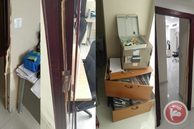
Israeli forces raided the headquarters of PalMedia production company, and searched several offices belonging to Arab and international news outlets in Ramallah city, in the central occupied West Bank, during dawn hours on Saturday, seizing equipment and documents from at least one of the offices, over accusations of alleged “incitement.”
Media sources told Ma’an News Agency that Israeli forces raided the headquarters, which provides broadcast services to several media outlets, including Russia Today, al-Mayadeen, al-Manar, and al-Quds news. Israeli forces searched and damaged properties in these offices, according to the sources.
A reporter from RT, which also has an office in the building, said that Israeli forces had destroyed some of the doors to the media outlets’ offices in order to get inside. However, no equipment was confiscated from RT’s office during the raid.
Witnesses said that 10 Israeli army vehicles had surrounded the building in Ramallah city before raiding and searching the offices.
An Israeli army spokesperson said that Israeli forces had “seized media equipment and documents used for incitement” from a media office in Ramallah — however, the spokesperson could not specify which office the items had been confiscated from.
She added that the raid was part of “ongoing efforts against incitement” in the West Bank. Although the spokesperson was unable to provide details on what equipment was seized, she noted that the documents confiscated included “inciting pictures.”
Palestinian news agency WAFA reported that hard disks were among the equipment seized by Israeli forces during the raid.
Clashes also broke out between Israeli forces and Palestinians following the raid, with Palestinians “showering” the Israeli army vehicles with rocks as they left the area.
Meanwhile, the Palestinian Ministry of Information released a statement condemning the raid, saying that the targeting of media “proves Israel’s intentions to prevent the guardians of truth from continuing their media, national, and ethical role of transferring the message of our people’s desired freedom.”
The ministry called upon the International Federation of Journalists to take immediate actions against the Israeli violations, and for the UN Security Council to apply Resolution 2222 to the Palestinian territory in order to provide protection to journalists.
Israeli authorities have long restricted Palestinian freedom of expression through censoring social media activity and imprisoning journalists, activists, poets, and novelists.
Saturday’s raid was not the first time PalMedia has been raided by Israeli forces for alleged “incitement.” In 2014, Israeli forces raided the headquarters and shut down the “Good Morning Jerusalem” broadcast as it was being filmed live in a PalMedia studio.
Following the raid three years ago, Reporters Without Borders said that the raid had “joined the long list of violations of Palestinian news media rights by the Israeli security forces, with never-ending threats, arrests and military operations.”
The raid on Saturday directly followed two weeks of a mass civil disobedience campaign led by Palestinians, in occupied East Jerusalem, after the Israelis installed security equipment at the gates of Al-Aqsa Mosque, and subsequently banned Palestinians under the age of 50 from entering the holy site.
Israeli Prime Minister Benjamin Netanyahu used the occasion to point blame at the Qatar-based news network Al Jazeera for deliberately “inciting violence” at Al-Aqsa for its coverage of the events, and demanded that Israeli authorities shutter their offices in Israel.
Meanwhile, Israel has been accused of labeling any media that is critical of Israel and its policies in Palestinian communities as “incitement” in order to stifle criticisms of Israel’s discriminatory policies in Israel, its continued occupation of the West Bank for its 50th year, and its decade-long siege of the Gaza Strip that has collapsed the territory into an interminable humanitarian crisis.
Media sources told Ma’an News Agency that Israeli forces raided the headquarters, which provides broadcast services to several media outlets, including Russia Today, al-Mayadeen, al-Manar, and al-Quds news. Israeli forces searched and damaged properties in these offices, according to the sources.
A reporter from RT, which also has an office in the building, said that Israeli forces had destroyed some of the doors to the media outlets’ offices in order to get inside. However, no equipment was confiscated from RT’s office during the raid.
Witnesses said that 10 Israeli army vehicles had surrounded the building in Ramallah city before raiding and searching the offices.
An Israeli army spokesperson said that Israeli forces had “seized media equipment and documents used for incitement” from a media office in Ramallah — however, the spokesperson could not specify which office the items had been confiscated from.
She added that the raid was part of “ongoing efforts against incitement” in the West Bank. Although the spokesperson was unable to provide details on what equipment was seized, she noted that the documents confiscated included “inciting pictures.”
Palestinian news agency WAFA reported that hard disks were among the equipment seized by Israeli forces during the raid.
Clashes also broke out between Israeli forces and Palestinians following the raid, with Palestinians “showering” the Israeli army vehicles with rocks as they left the area.
Meanwhile, the Palestinian Ministry of Information released a statement condemning the raid, saying that the targeting of media “proves Israel’s intentions to prevent the guardians of truth from continuing their media, national, and ethical role of transferring the message of our people’s desired freedom.”
The ministry called upon the International Federation of Journalists to take immediate actions against the Israeli violations, and for the UN Security Council to apply Resolution 2222 to the Palestinian territory in order to provide protection to journalists.
Israeli authorities have long restricted Palestinian freedom of expression through censoring social media activity and imprisoning journalists, activists, poets, and novelists.
Saturday’s raid was not the first time PalMedia has been raided by Israeli forces for alleged “incitement.” In 2014, Israeli forces raided the headquarters and shut down the “Good Morning Jerusalem” broadcast as it was being filmed live in a PalMedia studio.
Following the raid three years ago, Reporters Without Borders said that the raid had “joined the long list of violations of Palestinian news media rights by the Israeli security forces, with never-ending threats, arrests and military operations.”
The raid on Saturday directly followed two weeks of a mass civil disobedience campaign led by Palestinians, in occupied East Jerusalem, after the Israelis installed security equipment at the gates of Al-Aqsa Mosque, and subsequently banned Palestinians under the age of 50 from entering the holy site.
Israeli Prime Minister Benjamin Netanyahu used the occasion to point blame at the Qatar-based news network Al Jazeera for deliberately “inciting violence” at Al-Aqsa for its coverage of the events, and demanded that Israeli authorities shutter their offices in Israel.
Meanwhile, Israel has been accused of labeling any media that is critical of Israel and its policies in Palestinian communities as “incitement” in order to stifle criticisms of Israel’s discriminatory policies in Israel, its continued occupation of the West Bank for its 50th year, and its decade-long siege of the Gaza Strip that has collapsed the territory into an interminable humanitarian crisis.
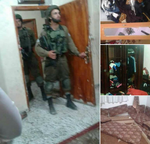
Israeli soldiers abducted, on Saturday at dawn, four Palestinians, including one with special needs, in the West Bank governorates of Hebron and Bethlehem.
The Hebron office of the Palestinian Prisoners’ Society (PPS) said the soldiers invaded several homes and abducted Majdi Radi al-Juneidi and Abdul-Elah Mohammad Sa’id, 16.
The soldiers also installed roadblocks on roads leading to Yatta town, and the al-Fawwar refugee camp, south of Hebron, in addition to Sa’ir and Halhoul towns, north of Hebron, before stopping and searching dozens of cars, while inspecting the ID cards of the passengers and interrogating some of them.
Furthermore, several army jeeps invaded many neighborhoods in Hebron city, before the soldiers invaded and ransacked homes in the area.
In related news, the soldiers invaded Doha town, west of Bethlehem, and abducted a Palestinian with special needs, identified as Hamza Abdullah al-‘Afifi.
The soldiers also invaded a restaurant in the center of Bethlehem city, and abducted Ahmad Anwar Eghneimat, 21.
On Friday at night, the soldiers shot and injured two Palestinians with rubber-coated steel bullets, during clashes that took place near the Gate of the Tribes, in occupied East Jerusalem.
The clashes erupted after the soldiers assaulted many Palestinians, and prevented dozens from entering the Al-Aqsa Mosque.
The Hebron office of the Palestinian Prisoners’ Society (PPS) said the soldiers invaded several homes and abducted Majdi Radi al-Juneidi and Abdul-Elah Mohammad Sa’id, 16.
The soldiers also installed roadblocks on roads leading to Yatta town, and the al-Fawwar refugee camp, south of Hebron, in addition to Sa’ir and Halhoul towns, north of Hebron, before stopping and searching dozens of cars, while inspecting the ID cards of the passengers and interrogating some of them.
Furthermore, several army jeeps invaded many neighborhoods in Hebron city, before the soldiers invaded and ransacked homes in the area.
In related news, the soldiers invaded Doha town, west of Bethlehem, and abducted a Palestinian with special needs, identified as Hamza Abdullah al-‘Afifi.
The soldiers also invaded a restaurant in the center of Bethlehem city, and abducted Ahmad Anwar Eghneimat, 21.
On Friday at night, the soldiers shot and injured two Palestinians with rubber-coated steel bullets, during clashes that took place near the Gate of the Tribes, in occupied East Jerusalem.
The clashes erupted after the soldiers assaulted many Palestinians, and prevented dozens from entering the Al-Aqsa Mosque.
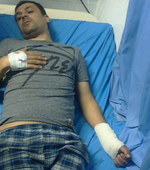
Israeli soldiers shot and injured, on Friday evening, a young Palestinian man, while in his own land with his children, in Deir Ballout town, west of Salfit, in the northeastern part of the occupied West Bank.
The soldiers shot Fa’ed Saleh Mousa, 33, with a live round in his left arm, after they fired many rounds at him, and members of his family, causing a moderate injury.
Sa’ed, the brother of Fa’ed, said that he, his brother, and with their children, went to their orchard, behind the Annexation Wall, west of Salfit, to water the trees.
>“We go their every Friday to water our olive trees, but approximately at 7:30 in the evening, a military jeep drove by, and stopped, before the soldiers stepped out of the vehicle, and started firing live rounds towards us at random,” Sa’ed stated.
“Our children were with us; we just hide behind some rocks, and that is when my brother was shot,” he added, “There were two other guys standing near us, both from Qalqilia, and wanted to cross into Israel for work.”
“I then called a member of Deir Ballout Local Council, and informed him of what’s happening,” Sa’ed stated, “He said that he would contact the District Coordination Office, maybe they can contact the Israeli side and see why they are shooting at us… the soldiers stayed there for some time; they didn’t even approach us, and later they just left.”
The soldiers shot Fa’ed Saleh Mousa, 33, with a live round in his left arm, after they fired many rounds at him, and members of his family, causing a moderate injury.
Sa’ed, the brother of Fa’ed, said that he, his brother, and with their children, went to their orchard, behind the Annexation Wall, west of Salfit, to water the trees.
>“We go their every Friday to water our olive trees, but approximately at 7:30 in the evening, a military jeep drove by, and stopped, before the soldiers stepped out of the vehicle, and started firing live rounds towards us at random,” Sa’ed stated.
“Our children were with us; we just hide behind some rocks, and that is when my brother was shot,” he added, “There were two other guys standing near us, both from Qalqilia, and wanted to cross into Israel for work.”
“I then called a member of Deir Ballout Local Council, and informed him of what’s happening,” Sa’ed stated, “He said that he would contact the District Coordination Office, maybe they can contact the Israeli side and see why they are shooting at us… the soldiers stayed there for some time; they didn’t even approach us, and later they just left.”
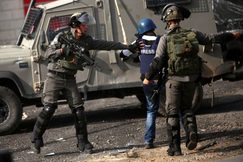
Israeli forces, Friday, opened fire at Palestinians who rallied in solidarity with Al-Aqsa Mosque near Huwwara checkpoint, south of Nablus, injuring a photojournalist.
Ayman al-Nobani, a photojournalist with the Palestinian Authority’s official news agency (WAFA), was shot and injured with a bullet as he was covering the rally.
Israeli forces also fired tear gas canisters at protestors, causing many to suffer from suffocation.
This came as heavy Israeli police reinforcements were deployed at the compound and inside the Old City of Jerusalem, in anticipation of heavy clashes following Friday prayers.
Fresh clashes erupted after Israeli police, Thursday evening, detained some 120 Palestinians and injured scores of others as worshippers gathered at the holy esplanade, for the first time in two weeks since Israel lifted recent tightened measures imposed at the site.
An estimated 120,000 Palestinians had gathered to perform prayers inside the holy site on Thursday evening, after all gates of the site were reopened, though the Remission Gate (Bab al-Hutta), and closed again, shortly afterwards.
This came just after Palestinians took to the streets of Jerusalem, to celebrate the re-opening of the compound.
Israel has set up the metal detectors and cameras at the entrances to the site and taken other tightened measures, following a fatal attack that left the assailants, three Palestinian citizens of Israel, and two Israeli police officers dead on July 14.
Palestinians and Muslim clerics have widely perceived the installations as an Israeli attempt to use Israeli-Palestinian violence to extend control over East Jerusalem and the Noble Sanctuary, further restricting Palestinian and Muslim access.
Ayman al-Nobani, a photojournalist with the Palestinian Authority’s official news agency (WAFA), was shot and injured with a bullet as he was covering the rally.
Israeli forces also fired tear gas canisters at protestors, causing many to suffer from suffocation.
This came as heavy Israeli police reinforcements were deployed at the compound and inside the Old City of Jerusalem, in anticipation of heavy clashes following Friday prayers.
Fresh clashes erupted after Israeli police, Thursday evening, detained some 120 Palestinians and injured scores of others as worshippers gathered at the holy esplanade, for the first time in two weeks since Israel lifted recent tightened measures imposed at the site.
An estimated 120,000 Palestinians had gathered to perform prayers inside the holy site on Thursday evening, after all gates of the site were reopened, though the Remission Gate (Bab al-Hutta), and closed again, shortly afterwards.
This came just after Palestinians took to the streets of Jerusalem, to celebrate the re-opening of the compound.
Israel has set up the metal detectors and cameras at the entrances to the site and taken other tightened measures, following a fatal attack that left the assailants, three Palestinian citizens of Israel, and two Israeli police officers dead on July 14.
Palestinians and Muslim clerics have widely perceived the installations as an Israeli attempt to use Israeli-Palestinian violence to extend control over East Jerusalem and the Noble Sanctuary, further restricting Palestinian and Muslim access.
28 july 2017
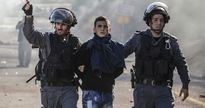
The Israeli Occupation Forces (IOF) arrested at dawn Friday a number of Palestinians from different parts of the West Bank, and notified the family of a slain Palestinian with demolition of their house to the south of Ramallah.
IOF claimed in a statement issued early today that seven Palestinians were rounded up in the pre-dawn raids.
According to our field reporters, three youths were detained in Ramallah including a journalist while three others were arrested in Jenin. A young man was also kidnapped from Dura town in al-Khalil.
Along the same line, several local houses were stormed and violently searched in Kubbar town, north of Ramallah, including Halamish attacker’s house.
IOF later notified the demolition of the house.
Meanwhile, violent clashes broke out when IOF soldiers stormed in large numbers the towns of Qafin and Baqa al-Sharqiyah north of Tulkarem in the northern West Bank in total provocation to local residents.
Teargas inhalation cases were reported during the clashes including five members of the same family.
Raids were also reported in Azzun town to the east of Qalqilia, where a house belonging to Nader Radwan was violently stormed and searched. His family members were investigated during the raid.
IOF erected a military checkpoint at the entrance to the town before leaving the area.
IOF claimed in a statement issued early today that seven Palestinians were rounded up in the pre-dawn raids.
According to our field reporters, three youths were detained in Ramallah including a journalist while three others were arrested in Jenin. A young man was also kidnapped from Dura town in al-Khalil.
Along the same line, several local houses were stormed and violently searched in Kubbar town, north of Ramallah, including Halamish attacker’s house.
IOF later notified the demolition of the house.
Meanwhile, violent clashes broke out when IOF soldiers stormed in large numbers the towns of Qafin and Baqa al-Sharqiyah north of Tulkarem in the northern West Bank in total provocation to local residents.
Teargas inhalation cases were reported during the clashes including five members of the same family.
Raids were also reported in Azzun town to the east of Qalqilia, where a house belonging to Nader Radwan was violently stormed and searched. His family members were investigated during the raid.
IOF erected a military checkpoint at the entrance to the town before leaving the area.
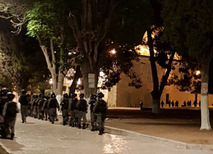
Dozens of Israeli soldiers invaded, shortly after midnight, the courtyards of the Al-Aqsa Mosque, in occupied East Jerusalem, and assaulted hundreds of worshipers, wounding dozens, in addition to shooting 15 worshipers, including two who suffered serious wounds, and six medics, with rubber-coated steel bullets in the head, and abducted 120 worshipers.
The invasion into the mosque started from al-Magharba Gate area, when the soldiers fired many firebombs, gas bombs, concussion grenades and rubber-coated steel bullets, to force the Palestinians out of the holy site.
The soldiers then surrounded al-Qibli mosque, in Al-Aqsa compound, abducted 120 Palestinians, including two guards of Al-Aqsa, identified as Khaled Sharawna and Luay al-Qawasmi, and moved them to several detention and interrogation facilities.
Medical sources said the Israeli attack led to dozens of injuries, including fifteen who were shot with rubber-coated steel bullets in their heads, and six medics.
The soldiers also prevented dozens of medics from entering Al-Aqsa Mosque, and attacked many of them, before closing it to all Palestinians.
The sources added that many Palestinians suffered serious injuries, two of them were rushed to al-Magharba Gate, and were moved to a hospital by an Israeli ambulance.
The Maan News Agency said the soldiers confiscated the mobile phones from all the abducted Palestinians, in addition to abducting another Palestinian, identified as Mohammad Khader Abu al-Hummus, near Damascus Gate.
The attack was the second in just a few hours, as the soldiers assaulted dozens of worshipers after evening prayers, Thursday, and fired dozens of gas bombs and concussion grenades, in addition to several live rounds, to remove the Palestinians out of the mosque, before shutting down all of its gates, and the Old City gates.
The Israeli army and police also prevented all Palestinians males, below the age of fifty, from entering Jerusalem’s Old City.
It is worth mentioning that various Palestinian figures, including national and religious leaders, are planning to hold an urgent meeting to discuss the renewed Israeli escalation, which comes hours after the army lifted the siege on the mosque, after the constant and persistent struggle to end the siege, which was violently reinstated ahead of Friday prayers.
The situation in Jerusalem remains very tense, especially as the army pushed dozens of additional units around Al-Aqsa, and the Old City, in addition to installing dozens of roadblocks and deploying mounted units, preventing the Palestinians from approaching the holy site.
The invasion into the mosque started from al-Magharba Gate area, when the soldiers fired many firebombs, gas bombs, concussion grenades and rubber-coated steel bullets, to force the Palestinians out of the holy site.
The soldiers then surrounded al-Qibli mosque, in Al-Aqsa compound, abducted 120 Palestinians, including two guards of Al-Aqsa, identified as Khaled Sharawna and Luay al-Qawasmi, and moved them to several detention and interrogation facilities.
Medical sources said the Israeli attack led to dozens of injuries, including fifteen who were shot with rubber-coated steel bullets in their heads, and six medics.
The soldiers also prevented dozens of medics from entering Al-Aqsa Mosque, and attacked many of them, before closing it to all Palestinians.
The sources added that many Palestinians suffered serious injuries, two of them were rushed to al-Magharba Gate, and were moved to a hospital by an Israeli ambulance.
The Maan News Agency said the soldiers confiscated the mobile phones from all the abducted Palestinians, in addition to abducting another Palestinian, identified as Mohammad Khader Abu al-Hummus, near Damascus Gate.
The attack was the second in just a few hours, as the soldiers assaulted dozens of worshipers after evening prayers, Thursday, and fired dozens of gas bombs and concussion grenades, in addition to several live rounds, to remove the Palestinians out of the mosque, before shutting down all of its gates, and the Old City gates.
The Israeli army and police also prevented all Palestinians males, below the age of fifty, from entering Jerusalem’s Old City.
It is worth mentioning that various Palestinian figures, including national and religious leaders, are planning to hold an urgent meeting to discuss the renewed Israeli escalation, which comes hours after the army lifted the siege on the mosque, after the constant and persistent struggle to end the siege, which was violently reinstated ahead of Friday prayers.
The situation in Jerusalem remains very tense, especially as the army pushed dozens of additional units around Al-Aqsa, and the Old City, in addition to installing dozens of roadblocks and deploying mounted units, preventing the Palestinians from approaching the holy site.
27 july 2017
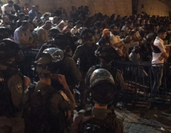
Israeli soldiers injured, on Thursday evening at least 121 Palestinians in the courtyards of Al-Aqsa Mosque, and the Old City, in occupied East Jerusalem.
The soldiers assaulted the worshipers following evening prayers, held in Al-Aqsa Mosque, courtyards and near the gates of the old city, and fired dozens of concussion grenades and rubber-coated steel bullets.
The Maan News Agency said the soldiers prevented hundreds of Palestinians from entering Al-Aqsa Mosque, an issue that pushed them to pray outside the holy site, including near the mosque’s ancient gates, and in the surrounding streets.
Hundreds of young Palestinian men, who were denied access to the mosque, prayed outside the holy sites near its gates and in the streets.
It added that the soldiers closed many of the gates, including Bab Hotta, while hundreds of officers were also deployed in the courtyards of the mosque and the Old City.
The soldiers then announced that only elders and women would be allowed into the holy site, for what they called “security considerations,” before the army and police resorted to excessive force to remove the worshipers, and issue that led to clashes.
The Palestinian Red Crescent (PCR) said its medics provided treatment to 113 Palestinians, adding that among the wounded are persons who were assaulted by the soldiers, and suffered fractures and bruises, in addition to many who were shot with rubber-coated steel bullets, gas bombs and concussion grenades.
The PRC added that its medics moved fifteen wounded Palestinians to hospitals and medical centers in occupied Jerusalem.
It also stated that the soldiers prevented its ambulances from reaching the gates leading to the mosque, and issue that forced the medics to rush into the holy site on foot carrying their stretchers and first aid tools.
It is worth mentioning that, despite the Israeli restrictions and blockades, more than 30.000 Palestinians managed to enter Al-Aqsa courtyards and held evening prayers.
The soldiers assaulted the worshipers following evening prayers, held in Al-Aqsa Mosque, courtyards and near the gates of the old city, and fired dozens of concussion grenades and rubber-coated steel bullets.
The Maan News Agency said the soldiers prevented hundreds of Palestinians from entering Al-Aqsa Mosque, an issue that pushed them to pray outside the holy site, including near the mosque’s ancient gates, and in the surrounding streets.
Hundreds of young Palestinian men, who were denied access to the mosque, prayed outside the holy sites near its gates and in the streets.
It added that the soldiers closed many of the gates, including Bab Hotta, while hundreds of officers were also deployed in the courtyards of the mosque and the Old City.
The soldiers then announced that only elders and women would be allowed into the holy site, for what they called “security considerations,” before the army and police resorted to excessive force to remove the worshipers, and issue that led to clashes.
The Palestinian Red Crescent (PCR) said its medics provided treatment to 113 Palestinians, adding that among the wounded are persons who were assaulted by the soldiers, and suffered fractures and bruises, in addition to many who were shot with rubber-coated steel bullets, gas bombs and concussion grenades.
The PRC added that its medics moved fifteen wounded Palestinians to hospitals and medical centers in occupied Jerusalem.
It also stated that the soldiers prevented its ambulances from reaching the gates leading to the mosque, and issue that forced the medics to rush into the holy site on foot carrying their stretchers and first aid tools.
It is worth mentioning that, despite the Israeli restrictions and blockades, more than 30.000 Palestinians managed to enter Al-Aqsa courtyards and held evening prayers.
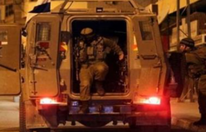
Israeli soldiers abducted, on Thursday at dawn, two Palestinian men, both former political prisoners, from their homes, in the West Bank governorate of Bethlehem. The soldiers also installed roadblocks in many areas in the northern West Bank governorate of Jenin.
Media sources in Bethlehem said the soldiers stormed and searched homes in ‘Adia refugee camp, north of Bethlehem, and abducted Bassam Ahmad Abu ‘Aker, 55.
The sources added that the soldiers also abducted Khader Mohammad Dalo, from al-Maslakh area, in the center of Bethlehem city.
The invasions led to clashes between the soldiers and many local youngsters, who hurled stones at the military jeeps, while the soldiers fire live rounds.
Furthermore, the soldiers installed many roadblocks in Jenin governorate, especially on Jenin-Jaffa road, and the entrances of Arraba, Ya’bad and Qabatia towns, before stopping and searching dozens of cars, and interrogated many Palestinians after detaining them.
It is worth mentioning that the Dotan military roadblock near Jenin remains closed by the soldiers for the fifth consecutive day, from 9 in the evening until four at dawn, preventing thousands of Palestinians, including students, workers, merchants, and medical professionals, from freely moving to and from many communities in Jenin and Tulkarem.
Media sources in Bethlehem said the soldiers stormed and searched homes in ‘Adia refugee camp, north of Bethlehem, and abducted Bassam Ahmad Abu ‘Aker, 55.
The sources added that the soldiers also abducted Khader Mohammad Dalo, from al-Maslakh area, in the center of Bethlehem city.
The invasions led to clashes between the soldiers and many local youngsters, who hurled stones at the military jeeps, while the soldiers fire live rounds.
Furthermore, the soldiers installed many roadblocks in Jenin governorate, especially on Jenin-Jaffa road, and the entrances of Arraba, Ya’bad and Qabatia towns, before stopping and searching dozens of cars, and interrogated many Palestinians after detaining them.
It is worth mentioning that the Dotan military roadblock near Jenin remains closed by the soldiers for the fifth consecutive day, from 9 in the evening until four at dawn, preventing thousands of Palestinians, including students, workers, merchants, and medical professionals, from freely moving to and from many communities in Jenin and Tulkarem.
26 july 2017
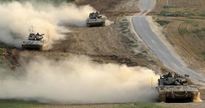
Israeli Occupation Forces (IOF) advanced a limited distance in Palestinian lands to the east of Gaza City on Wednesday.
Eyewitnesses told the PIC reporter that five Israeli bulldozers escorted by three tanks advanced into lands to the eastern outskirts of Gaza amid leveling and measuring works in the lands adjacent to the border separation fence.
Israeli military vehicles and bulldozers advanced into the waste complex east of Juhr al-Deek village. Israeli drones were seen flying in the skies of the village during the incursion, the eyewitnesses pointed out.
Eyewitnesses told the PIC reporter that five Israeli bulldozers escorted by three tanks advanced into lands to the eastern outskirts of Gaza amid leveling and measuring works in the lands adjacent to the border separation fence.
Israeli military vehicles and bulldozers advanced into the waste complex east of Juhr al-Deek village. Israeli drones were seen flying in the skies of the village during the incursion, the eyewitnesses pointed out.
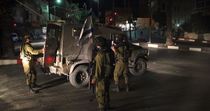
The Israeli Occupation Forces (IOF) arrested early Wednesday 21 Palestinians from different cities and towns in the West Bank.
Several youths were detained in Nablus after IOF broke into its Akar refugee camp east of the city, which led to the outbreak of limited clashes.
A military checkpoint was also erected in the neighboring town of Udla, where several Palestinian vehicles were stopped and searched.
A minor was among the reported arrests in the city.
In Bethlehem, an activist was arrested from his family house in Takoa town and taken to unknown detention center.
Violent raids were also carried out in Beit Fujar town south of the city, with no arrests reported.
Similar raids were reported in al-Khalil, where IOF soldiers occupied a local house and turned it into a military barracks.
Also in al-Khalil, Israeli settlers carried out collective attacks against Palestinian properties in the Old City, and the towns of Yatta, Seir, and Beit Enoun.
Meanwhile, clashes erupted in Qalqilia when IOF soldiers violently stormed the city amid heavy firing of rubber bullets. Injuries were reported among the locals.
A young man was also detained in Jenin.
Several youths were detained in Nablus after IOF broke into its Akar refugee camp east of the city, which led to the outbreak of limited clashes.
A military checkpoint was also erected in the neighboring town of Udla, where several Palestinian vehicles were stopped and searched.
A minor was among the reported arrests in the city.
In Bethlehem, an activist was arrested from his family house in Takoa town and taken to unknown detention center.
Violent raids were also carried out in Beit Fujar town south of the city, with no arrests reported.
Similar raids were reported in al-Khalil, where IOF soldiers occupied a local house and turned it into a military barracks.
Also in al-Khalil, Israeli settlers carried out collective attacks against Palestinian properties in the Old City, and the towns of Yatta, Seir, and Beit Enoun.
Meanwhile, clashes erupted in Qalqilia when IOF soldiers violently stormed the city amid heavy firing of rubber bullets. Injuries were reported among the locals.
A young man was also detained in Jenin.
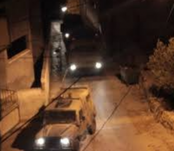
Israeli soldiers invaded, on Wednesday at dawn, many Palestinian communities in the West Bank governorates of Tulkarem, Jenin and Bethlehem, stormed and ransacked many homes and abducted eleven Palestinians, in addition to wounding one in Qalqilia, and causing many others to suffer the effects of teargas inhalation.
The Tulkarem office of the Palestinian Prisoners Society (PPS), in the northern part of the West Bank, said the soldiers invaded Atteel town, north of the city, broke into dozens of homes and interrogated many Palestinians, before abducting six.
It stated that the soldiers abducted Wasef Masarwa, 46, Wael Hilmi Odaetallah, Yasser Mohammad Odaetallah, As’ad Mohammad Odaetallah, As’ad Odaetallah and Ahmad Khaled Shokri.
Furthermore, the soldiers invaded homes in Qabatia town, south of the northern West Bank city of Jenin, abducted Yousef Nimir Khozeimiyya, 60, and his son ‘Ala, 24, after breaking into Yousef’s home looking for his nephew, Yasser.
The soldiers also abducted another Palestinian, identified as Rida Ahmad Turkman, 22, and withdrew from the town, taking the abducted Palestinians to an unknown destination.
In addition, the soldiers broke into many stores in Barta’a town, isolated behind the Annexation Wall, south of Jenin, and violently search them, causing damage.
Also, the Bethlehem office of the PPS said the soldiers abducted Omar Ahmad al-‘Amour, 24, from his home in Teqoua town, east of the city, while Nidal Ali Affana, 20, from Aida refugee camp, north of Bethlehem, was abducted a the Container military roadblock, northeast of Bethlehem.
In related news, several army jeeps invaded Qalqilia city, in northern West Bank, and clashed with dozens of youngsters, who hurled stones and empty bottles at the military, after the soldiers stormed and ransacked many homes.
The soldiers fired many rubber-coated steel bullets, concussion grenades and gas bombs, wounding a Palestinian with a rubber-coated steel bullet in the head, before he was moved to a local hospital.
Local medics also provided many Palestinians the needed treatment, due to the severe effects of teargas inhalation.
In the Gaza Strip, Israeli navy ships opened fire on many Palestinian fishing boats, in the northern part of the coastal region, forcing the fishers back to shore.
The Tulkarem office of the Palestinian Prisoners Society (PPS), in the northern part of the West Bank, said the soldiers invaded Atteel town, north of the city, broke into dozens of homes and interrogated many Palestinians, before abducting six.
It stated that the soldiers abducted Wasef Masarwa, 46, Wael Hilmi Odaetallah, Yasser Mohammad Odaetallah, As’ad Mohammad Odaetallah, As’ad Odaetallah and Ahmad Khaled Shokri.
Furthermore, the soldiers invaded homes in Qabatia town, south of the northern West Bank city of Jenin, abducted Yousef Nimir Khozeimiyya, 60, and his son ‘Ala, 24, after breaking into Yousef’s home looking for his nephew, Yasser.
The soldiers also abducted another Palestinian, identified as Rida Ahmad Turkman, 22, and withdrew from the town, taking the abducted Palestinians to an unknown destination.
In addition, the soldiers broke into many stores in Barta’a town, isolated behind the Annexation Wall, south of Jenin, and violently search them, causing damage.
Also, the Bethlehem office of the PPS said the soldiers abducted Omar Ahmad al-‘Amour, 24, from his home in Teqoua town, east of the city, while Nidal Ali Affana, 20, from Aida refugee camp, north of Bethlehem, was abducted a the Container military roadblock, northeast of Bethlehem.
In related news, several army jeeps invaded Qalqilia city, in northern West Bank, and clashed with dozens of youngsters, who hurled stones and empty bottles at the military, after the soldiers stormed and ransacked many homes.
The soldiers fired many rubber-coated steel bullets, concussion grenades and gas bombs, wounding a Palestinian with a rubber-coated steel bullet in the head, before he was moved to a local hospital.
Local medics also provided many Palestinians the needed treatment, due to the severe effects of teargas inhalation.
In the Gaza Strip, Israeli navy ships opened fire on many Palestinian fishing boats, in the northern part of the coastal region, forcing the fishers back to shore.
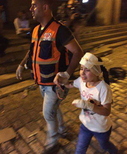
Israeli soldiers attacked, on Tuesday evening, Palestinian worshipers after holding evening prayers in the Gate of the Tribes area, near al-Aqsa Mosque, in occupied East Jerusalem, wounding dozens of Palestinians, including a child and a journalist, in addition to abducting a journalist.
The WAFA Palestinian News Agency has reported that the soldiers assaulted the Palestinians in a surprise attack near al-Ghazali area, striking them with batons, in addition to firing many gas bombs and concussion grenades at them.
The Palestinian Red Crescent (PRC) has reported that its medics moved three Palestinians to a hospital, including a child, only ten years of age, who was shot with concussion grenades in her head and arm.
PRC medics also provided the needed treatment to thirteen Palestinians, who were shot with rubber-coated steel bullets; one of them is a journalist, identified as Fatima al-Bakri.
In addition, the soldiers abducted a journalist identified as Fayez Abu Rmeila, and took him to an unknown destination.
The WAFA Palestinian News Agency has reported that the soldiers assaulted the Palestinians in a surprise attack near al-Ghazali area, striking them with batons, in addition to firing many gas bombs and concussion grenades at them.
The Palestinian Red Crescent (PRC) has reported that its medics moved three Palestinians to a hospital, including a child, only ten years of age, who was shot with concussion grenades in her head and arm.
PRC medics also provided the needed treatment to thirteen Palestinians, who were shot with rubber-coated steel bullets; one of them is a journalist, identified as Fatima al-Bakri.
In addition, the soldiers abducted a journalist identified as Fayez Abu Rmeila, and took him to an unknown destination.
